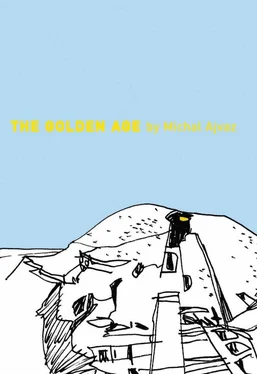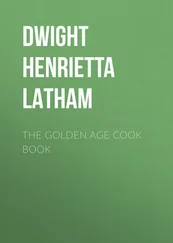Michal Ajvaz - The Golden Age
Здесь есть возможность читать онлайн «Michal Ajvaz - The Golden Age» весь текст электронной книги совершенно бесплатно (целиком полную версию без сокращений). В некоторых случаях можно слушать аудио, скачать через торрент в формате fb2 и присутствует краткое содержание. Год выпуска: 2010, Издательство: Dalkey Archive Press, Жанр: Современная проза, на английском языке. Описание произведения, (предисловие) а так же отзывы посетителей доступны на портале библиотеки ЛибКат.
- Название:The Golden Age
- Автор:
- Издательство:Dalkey Archive Press
- Жанр:
- Год:2010
- ISBN:нет данных
- Рейтинг книги:4 / 5. Голосов: 1
-
Избранное:Добавить в избранное
- Отзывы:
-
Ваша оценка:
- 80
- 1
- 2
- 3
- 4
- 5
The Golden Age: краткое содержание, описание и аннотация
Предлагаем к чтению аннотацию, описание, краткое содержание или предисловие (зависит от того, что написал сам автор книги «The Golden Age»). Если вы не нашли необходимую информацию о книге — напишите в комментариях, мы постараемся отыскать её.
is Michal Ajvaz’s greatest and most ambitious work.
The Golden Age
The Golden Age — читать онлайн бесплатно полную книгу (весь текст) целиком
Ниже представлен текст книги, разбитый по страницам. Система сохранения места последней прочитанной страницы, позволяет с удобством читать онлайн бесплатно книгу «The Golden Age», без необходимости каждый раз заново искать на чём Вы остановились. Поставьте закладку, и сможете в любой момент перейти на страницу, на которой закончили чтение.
Интервал:
Закладка:
Then it came to him what the text was, and with eyes closed he whispered, “Schedién anemoisi feresthai kallipe…” When he opened his eyes again he was not surprised to see next to the plastic columns in the shape of an “M” a concrete full-round form (“O”), then a stake (“I”), a tool whose function he could not identify ( sigma ) and another stake (“I”). The tops of the object-letters were by now touched by the pink light. After the last stake there was a gap — a stretch of white, plastered wall which put him in mind of a sheet of paper sticking out of an enormous typewriter whose opening line was covered in typescript. Then came another group of objects: phi was represented by a small gate stood vertically, which on a round piece of scratched tin appeared to bear the remains of the legend “No Entry” the next “E” was a portion of a window. All thirty letters and three gaps were where they should be. Theta was particularly well done in a wooden hatch from which all the laths but the one in the centre had been ripped out, while pi had been produced in a block and tackle.
Schedién anemoisi feresthai kallipe . Leave your raft to drive before the wind. When the gods order the nymph Calypso to set Odysseus free, and after he drifts away from her island on a raft, Poseidon unleashes a fearful storm. With the last of his strength Odysseus clings to the raft as it is tossed hither and thither. As the waves roar all around him, he hears a woman’s voice. Ino, also called Leucothea, the goddess of the slim ankles, has risen before him from the waves. Odysseus was expecting her to come to his aid, he was hoping she would calm the storm, would repair his disintegrating sail, or that she would carry him away to shore. But to his surprise Ino demands of him the most nonsensical thing imaginable in the circumstances. She tells him to quit his raft, his last hope, to give himself up to the wild water. Odysseus is slow to obey; he is hesitant, asking himself if this is a trick the gods are playing on him. In the end the decision is taken out of his hands by Poseidon, who smashes the vessel and casts Odysseus to the waves. Is not Poseidon, who would have Odysseus roam the seas, truly his friend? This is a difficult question to answer. As the case may be, the sea carries Odysseus to the shore of the island of the Phaeacians, where he meets Nausicaä and from where he sets sail for Ithaca, where Penelope, Telemachus and Argos are waiting for him.
Baumgarten smiled. He did not take long to consider what this strangely conveyed message meant for him. And its content did not surprise him as it had Odysseus because he had known it all along. What had befallen him was quite plain: the book he was writing had grown out of the pain of emptiness and gradually it had filled this emptiness, but in so doing it had destroyed the ground that nourished it, and died; such things happen. And the solution, too, was simple: it was enough to return to the territory of the void, to let himself be carried by its waves and to wait. So rather than thinking about the content of the message, he thought about who could have sent it to him. There was no point in his suspecting any of the people of the village. Being a sceptic he told himself that this was nothing more than a strange coincidence; it was improbable but not impossible. Quite simply he had dreamed that a local deity, lord of sad villages around Prague, demon of abandoned bus stops, had spoken to him. In the end he decided to understand the notice composed of objects as a message from Ino of the beautiful ankles, daughter of Cadmus, founder of the seven-gated city of Thebes, who had been transformed into a marine divinity and had now, for his sake, descended on the yard of this farm.
He decided, too, to follow immediately the advice Ino had given him; he threw the part-written book in the dustbin, shortly afterwards abandoned in his Prague flat all books and papers with notes and extracts on the subject, and left the country. He settled in Paris because it seemed to him that this was a place where one could easily lose oneself, and this he wished to do. It was not his intention to become a clochard ; he wished to live in a foreign city and try again to be faithful to the void he had once betrayed, to wait for a glimpse of new motions as nonsensical and marvellous as the hymn about the embryology of being he had composed on the dusty streets around Prague and in country pubs.
As he walked the wastelands of the great city, as the faces of men and women unknown to him floated past in the streets like so many incurious fish, as his gaze wandered the facades of buildings and climbed through windows into flats whose furniture was angular and hostile, as he felt on his cheeks the cooling mask of a wind saturated in incomprehensible smells both foul and fine, a new joy was born within him. He changed his job often: he was a messenger and a gallery attendant, a custodian in a museum, a sales assistant. He glimpsed nothing that promised to be the germ of some kind of task; he took joy from the purity of emptiness, from its great airy halls, which he passed through light-footedly. He realized that the most important thing was not the task — a task born, perhaps, out of the emptiness, whose fineness and fragrance it preserved in itself — but the tranquil shelter of waiting for nothing. In this shelter a note of happiness was sounded and gained in strength. Perhaps his task in the great game was to make this realization.
One evening as he was dining in a cheap Chinese bistro in Montparnasse’s Rue d’Odessa, a familiar face appeared in the mirror in front of which he was sitting. It belonged to an associate professor from the Sorbonne, whom he had met in Prague when he was still working at the university. They talked for a while, and then the associate professor remembered that he was looking for someone to translate into French selected essays by Jan Mukařovský. Baumgarten thought the offer over for a while, and in the end he agreed to take the job on. This marked the beginning of his Paris career. After publication of the Mukařovský anthology he went on to edit his own anthologies of Czech structuralism, to which he wrote extensive introductions. He himself began to teach Aesthetics at the Sorbonne. He married a Frenchwoman and they had a son; they lived in a large penthouse on one of the great boulevards. The royal castle of emptiness dissolved. He never wrote the book he had intended to write in Prague. Only rarely did he remember the larva-like motions of being, the lost fragments of the Origins of Beauty and the period of his solitary walks on the fringes of Prague.
The roofs of Paris
As their fifteenth wedding anniversary approached he went to a jeweller’s and bought his wife a valuable diamond necklace. It was January; his wife and son were skiing in the Savoy Alps and would be returning in three days’ time. That day he worked in his room through the evening and deep into the night. Before going to bed he opened the window to air the room of his cigarette smoke. For a while he watched the snowflakes, whirling madly and illuminated by the light of the room, and the fresh snow on the sloping roof into which the window was set. Then he switched off the light and went to bed.
A light sleeper, he was woken by a faint rustling coming from the next room. Through the half-open door, in the weak light reflected from the snow he made out the slim figure of a woman. She was wearing black overalls, their pockets swelling in a number of places. Above her head — which was covered with a black mask with three holes in it (two for the eyes and one for the nose) — the cold air entering through the open window caused the white curtain to ripple. The woman in black was leaning over the jewellery box into which that evening he had placed the necklace; carefully yet briefly she felt around inside it. When she withdrew her black hand Baumgarten saw a thin, glittering string dangling from the leather-clad fingers. What he was watching reminded him of a scene from a bad thriller. He took his revolver from the drawer of his bedside table; then he jumped out of bed. Catching sight of him, the woman slipped the necklace into one of her pockets, jumped up onto the windowsill and then out of view. Baumgarten grabbed his dressing gown from the armchair next to his bed and quickly pulled it on over his pyjamas. He put his bare feet into his shoes before climbing out of the window and onto the sloping, snow-covered roof.
Читать дальшеИнтервал:
Закладка:
Похожие книги на «The Golden Age»
Представляем Вашему вниманию похожие книги на «The Golden Age» списком для выбора. Мы отобрали схожую по названию и смыслу литературу в надежде предоставить читателям больше вариантов отыскать новые, интересные, ещё непрочитанные произведения.
Обсуждение, отзывы о книге «The Golden Age» и просто собственные мнения читателей. Оставьте ваши комментарии, напишите, что Вы думаете о произведении, его смысле или главных героях. Укажите что конкретно понравилось, а что нет, и почему Вы так считаете.












